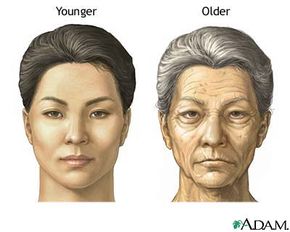The human body goes through a variety of changes as it gets older. In general, muscles, blood vessels and other tissues lose their elasticity. The heart becomes less efficient, bones become weaker and the metabolism slows down. Aging affects every part of the body -- check out the Mayo Clinic's summary of how aging affects each of the body's organ systems here.
In spite of the changes to the rest of the body, a lot of people focus primarily on changes to their appearance as they age. Americans spend billions of dollars per year on products to treat the external signs of aging. These include:
Advertisement
- Wrinkles: Fibers in the skin called collagen and elastin break down and lose strength as a person gets older. Sun exposure throughout life contributes to this process. Without these fibers, the skin cannot hold its shape as well. Older skin retains less fat, making it look less supple. The pull of gravity also causes the skin to sag.
- Dry skin: Older people produce less sweat and oil, causing their skin to be drier. Excessively dry skin can emphasize the appearance of wrinkles.
- Age spots: Dark spots on the skin, particularly the arms, hands, face and feet, stem from cumulative exposure to the sun. Most people call these marks liver spots, but they are unrelated to liver function. They actually stem from overproduction of the pigment melanin in areas of the skin that have experienced the most exposure to the sun.
Dermatologists stress that some factors that contribute to aging skin are preventable, including:
- Sun exposure: Scientists have proven that ultraviolet light from the sun contributes to skin cancer and cataracts. It also plays a role in the appearance of wrinkles and age spots. In addition to using sunscreens, people can reduce their exposure to the sun by: Wearing a hat with a wide brim Wearing sunglasses with lenses that block ultraviolet light Avoiding sun exposure in the middle of the day, when the sun is strongest Avoiding deliberate sun exposure
- Smoking: Smokers generally experience more wrinkles than nonsmokers. Doctors and scientists have not yet determined exactly how smoking contributes to wrinkles. They believe it may accelerate the natural aging process of collagen and elastin.
The National Library on Aging lists a collection of articles on the aging process and skin.
For more information, see:
Advertisement
